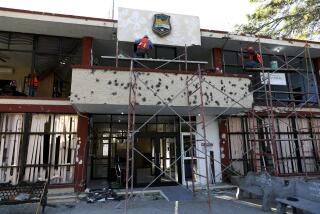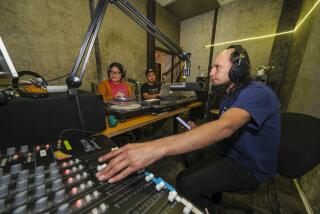Nicaragua Given More Soviet Arms Than in Past, U.S. Aide Says
- Share via
GUATEMALA CITY — Nicaragua received more Soviet-supplied weapons so far this year than it did in any previous full year, marking a new stage in the Central American arms race, a senior State Department official said Monday.
Elliott Abrams, assistant secretary of state for Latin America, said that as of Nov. 1, the Marxist-led Sandinista government had imported more than 20,000 tons of weaponry, including sophisticated helicopter gunships.
The previous record was 19,000 tons in all of 1984, he said. Shipments last year totaled 14,000 tons.
Abrams disclosed the figures to reporters aboard Secretary of State George P. Shultz’s aircraft on the way to Guatemala City, where Shultz is scheduled today to address the general assembly of the Organization of American States. Shultz is expected to reiterate the Reagan Administration’s criticism of Nicaragua in that speech.
The OAS opened its annual meeting Monday with the organization’s secretary general, Brazilian diplomat Joao Baenas Soares, warning that lasting peace in Central America can only be achieved by that region’s nations.
Support for Contadora Group
He said the OAS supports the efforts begun in January, 1983, by Colombia, Mexico, Panama and Venezuela--the so-called Contadora Group--to negotiate a peace treaty among the Central American nations.
Shultz, in an airborne news conference, said other Latin American nations have become increasingly disenchanted with Nicaragua. He said Latin American leaders generally support U.S. aid to the anti-Sandinista rebels, known as contras . Some of them have been publicly critical.
“They would be scared to death if we ran away from the contras,” Shultz said when asked about criticism of the U.S. program. “If they have a concern about it, it is that we won’t follow through.”
Shultz said President Reagan’s special envoy, Philip C. Habib, will visit all Central American countries except for Nicaragua next week to continue U.S. efforts to isolate the Managua government.
Shortly after he arrived in Guatemala, Shultz conferred with Argentine Foreign Minister Dante Caputo. He said he urged Argentina to seek a peaceful compromise of its latest dispute with Britain over the Falkland Islands.
Britain last month claimed a 200-mile exclusive fishing zone around the South Atlantic islands, which Britain governs as a colony but which are also claimed by Argentina. The government in Buenos Aires strongly protested the British move. Britain repelled an Argentine attempt to take the islands by force in 1982.
“We think the two countries involved--the U.K. and Argentina--ought to work it out between them,” Shultz said. “I said that to (British) Foreign Secretary Sir Geoffrey Howe and I will say the same thing to Mr. Caputo.”
Shultz said, however, that he will not attempt to mediate the dispute as did his predecessor, Alexander M. Haig Jr., when the Falklands War broke out.
The secretary of state also said he has forwarded to President Reagan his recommendations for new sanctions against Syria as a result of the Damascus regime’s support for terrorism. He refused to say what he had proposed, although he said last week that the United States would “take additional action.” The United States withdrew its ambassador from Syria late last month.
Shultz underlined U.S. support for Philippine President Corazon Aquino in the face of persistent coup rumors.
“I still have a Cory doll--I love Cory,” Shultz said. “I think she is doing basically a very good job and we support her. I don’t think the coup planners are. . . . “ He broke off at that point, then resumed, “I just support her; that’s our position.”
More to Read
Sign up for Essential California
The most important California stories and recommendations in your inbox every morning.
You may occasionally receive promotional content from the Los Angeles Times.










